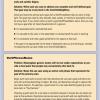The Latest
|
Why Agile Projects Don't Thrash[magazine] Tension is present on every software project. It comes from the stress of ensuring the software is fit for its purpose, which often leads to multiple changes. Find out why agile projects handle change better than most, and learn three things you can try on your next project to keep change in check. |
Ronald E. Jeffries
April 28, 2005 |
|
|
A Mind-Changing Exercise[article] After reading Naomi Karten's StickyMinds.com article "Thinking Inside the Box," in which she mentioned an experiential exercise she had facilitated, numerous readers contacted her to learn more about conducting such exercises. In this column, Naomi Karten describes one of her favorite team exercises, with details on how to conduct it and what to expect when you do. |
||
|
Stop Listening to Your Users[magazine] Just because you have a problem does not mean you are the best person to solve it. In this issue's Technically Speaking, Mike Cohn recommends truly involving users as participants in the process instead of just asking them what they want. |
||
|
Estimating Testing Time[article] Testers are always facing a time crunch. As part of a recent assessment, a senior manager asked, "How long should the testing really take? It takes our testers from four, five, six, to thirty (insert your number of choice here) weeks, and we need it to take less time. Why can't it take less time, and how can we tell what's going on so we know how much testing we need?" In this column, Johanna Rothman answers with a timeline. By estimating how many testing cycles will be needed, plus how long each will take, she can map out the entire testing process. From this viewpoint, she is able to pinpoint where the process can be streamlined thus reducing the time spent testing. |
||
|
Open Source Disk Imaging with Frisbee[magazine] Need to get the scoop on the latest software tests and trends? You’ve come to the right place. Get one reviewer’s opinion of Frisbee as well as some facts straight from the developer’s mouth. |
||
|
|
What's the Buzz[magazine] Need information but don’t have time to wade through bookracks looking for that perfect reference? The StickyMinds.com Books Guide can help. Get the scoop from StickyMinds.com members on three books that can keep you up to date on the latest issues. |
|
|
Repeating the Unrepeatable Bug[magazine] At some point in their careers, most testers experience the frustration of "The Unrepeatable Bug." Find out why one tester thinks that bug is a myth, and learn ways to duplicate the seemingly impossible. |
||
|
Explosions, Education and e-Commerce[magazine] Get the software engineering slant on items from the recent news. |
Pam Young
April 14, 2005 |
|
|
The Power of Two[magazine] We’re pleased to bring you technical editors who are well respected in their fields. Get their take on everything that relates to the industry, technically speaking. In this issue, see how pair work benefits everyone and why two brains are better than one. |
Brian Marick
April 14, 2005 |
|
 |
Grow Your Test Harness Naturally[magazine] Spring is in the air. It’s the time of year when plants wake from their winter dormancy and start growing out of control. Kind of like building a test harness. Take a tip from the Agile field this season and build your harness one test at a time. No fertilizer required. |
Kevin Lawrence
April 14, 2005 |
|
|
Creative License[magazine] Project managers seldom worry about nurturing the creative sides of team members. But if you plan and schedule for creativity the way you do for the more tangible aspects of your software project, you might be pleasantly surprised at the practical results you gain. |
|
 |
Form Fitting: Patterns to Judge the Effectiveness of Use Cases[magazine] You don't have to be Giorgio Armani to fashion effective use cases. Use case patterns can provide you with a vocabulary to help you describe and judge the quality of your use cases. Find out how you can use these patterns to improve your requirements modelin |
Steve Adolph
April 14, 2005 |
 |
Let Me Get Back to You[article] Sometimes the best thing that can be said during a confrontation is nothing at all. But if you're forced to respond, just promise that you'll get back to the situation at a better time. In this week's column, Peter Clark recalls a time when a competitor completely extinguished any chances of striking a business deal by letting his temper flare...in front of an audience during a teleconference call. From that incident, Peter learned to recognize when people are dangerously reaching their breaking points. No longer intimidated by temperamental barks, Peter explains how he keeps his cool during battle. |
Peter Clark
April 8, 2005 |
|
Show Me the Money[magazine] Turn to The Last Word, where software professionals who care about quality give you their opinions on hot topics. This month, read how adding gauges to your software can show stakeholders how well it is meeting their goals. |
||
|
Code Craft: Tame the Name[article] All code is not created equal. Learn from a master of the craft how to spot bad code and mold it into good. In the first iteration of this regular column, learn why selecting names for classes, methods, and variables is an art you'll want to perfect. |
Mike Clark
April 5, 2005 |








